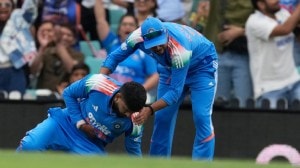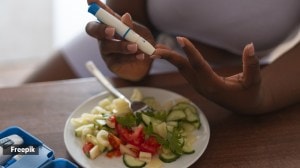Navratilova loses to youth, but not to fans
There are competitors at this French Open who did not appreciate Martina Navratilova playing singles here at the boundary-stretching age of ...

There are competitors at this French Open who did not appreciate Martina Navratilova playing singles here at the boundary-stretching age of 47. They wanted her to stay on the doubles court and leave the precious singles wild cards and the sport’s grand stage to the much younger set.
But the fans gathered in the round and cozy confines of Court One on Tuesday did not appear to share that hard line. They gave Navratilova an extended ovation as she walked back on a singles court here for the first time since 1994, to face an Argentine 28 years her junior. And though she could wrest only four games away from Gisela Dulko, the fans gave Navratilova another extended round of applause as she shuffled off, a loser.
‘‘The crowd was great; I just wanted to stay out there a bit longer to give them something to cheer about,’’ Navratilova said. ‘‘I had some moments of brilliance, but they were few and far between, unfortunately.’’
Still her game was far from an embarrassment. There were several flourishes of vintage Navratilova — a technically perfect overhead here, a crisply chipped backhand approach shot or smooth split-step there — that generated rumbles of approval from the stands and flurries of note-taking in the overstuffed press box.
But for all Navratilova’s hustling attempts to transform this conversation piece into a highly-competitive tennis match, it never quite superseded nostalgia. The only chance for more than that came in the second set, when Navratilova broke Dulko’s serve, to take a 3-2 lead.
But the lithe teenager from Buenos Aires would win the next four games to close out her first victory in a Grand Slam tournament. Now all she needs are 303 more to catch up with Navratilova.
‘‘I think she played great,’’ said Dulko, the world’s 64th-ranked player.
|
Grass craving now
|
|||||
|
• Martina Navratilova is aiming at one more emotional appearance at Wimbledon. After collecting seven of her 18 career Grand Slam titles at Wimbledon, she wants to bow out only after one more appearance on the grass of the All England Club. ‘‘I need to see how the body holds up. I need to win a few matches at Eastbourne before I would put myself on the line at Wimbledon,’’ said Navratilova. Story continues below this ad |
|||||
Even before the draw, Dulko had a premonition that she would be playing against her. Last week, she watched Navratilova in doubles in Vienna, and told her brother and coach, Alejandro, that it would be fun to play her once. After she heard that Navratilova had been awarded a singles wild card by French Open organisers, she told Alejandro that Navratilova was going to be her opponent.
‘‘He couldn’t believe it when he saw the draw,’’ Dulko said with a laugh. In truth, it was a fine draw. Normally, for a player of Dulko’s modest ranking and profile to get on a show court, she would need to play one of the game’s heavyweights: a Williams sister, a Justine Henin-Hardenne or an Amelie Mauresmo. In this case, Dulko had both the guaranteed exposure and the edge.
‘‘I was playing the same rhythm I used to play, but I didn’t have to think so hard then,’’ Navratilova said. ‘‘Keep in mind, this is my fifth match in 10 years so, of course.’’
While Navratilova took a self-critical approach, others were wide-eyed with wonder. ‘‘I was just thinking: how do you play at that age?’’ said second-seeded Serena Williams, who watched the beginning of Navratilova’s match before marching out to win her own. ‘‘She’s really an amazing athlete; amazing woman.’’
But not so amazing an athlete that she can beat up on the much younger set in singles. Since her comeback on the women’s tour in 2002, Navratilova has gradually remade herself into a major force in doubles, rising to the top 10 in rankings. In 2002, she lost a bet with her coach and entered the singles in Eastbourne, beating the world’s 22nd-ranked player, Tatiana Panova of Russia, and then pushing Daniela Hantuchova, then ranked 13th, to three sets.
But that was on grass, the surface on which Navratilova won a record nine Wimbledon singles titles. This singles comeback has come on clay, not the place to thrive for a champion who has lost a step. And she is now 0-3 this spring after losing in the first round in Amelia Island, in Charleston and Roland Garros.
Why is an 18-time Grand Slam singles champion putting herself through this? ‘‘The reason I wanted to play singles was to improve my doubles game, to really be a better player — period,’’ she said.
She is not the oldest woman to play singles at this level. That would be Blanche Bingley of Britain, a six-time Wimbledon champion who played her final match at the All England Club at the age of 49. It should be mentioned, however, that Bingley played that match in 1913 when tennis was much more garden party than cutthroat business.
Consider some of the reactions to Navratilova’s wild card. ‘‘She’s got no reason to be here,’’ said Emilie Loit, the French contestant. ‘‘It’s so sad to give a wild card to a 47-year-old woman. A young French player had to miss the tournament because of her.’’ Loit was referring to Capucine Rousseau, the French teenager who would have received Martina’s wild card.
‘‘I think I earned it,’’ Navratilova said. ‘‘If she wins two French Opens and tries to get a wild card at the age of 47, she’ll probably get it, too. I didn’t get a wild card when I was 16. I earned my way.’’ (The New York Times)



- 01
- 02
- 03
- 04
- 05




























